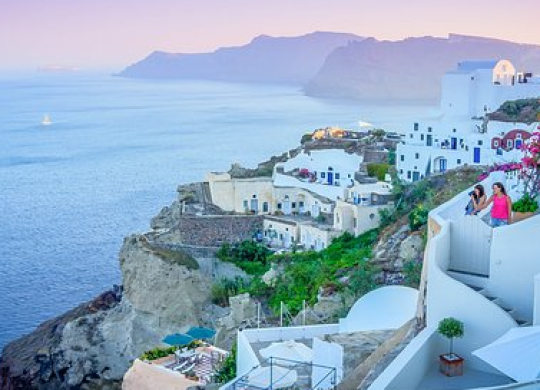Greece Travel Guide 2025: Entry Requirements, Customs Rules, When to Go & What to See

Planning a trip to Greece in 2025? Find out all about current entry regulations, customs requirements, the best time to visit, key tourist destinations and tips for a safe and comfortable journey. An updated guide for tourists from all over the world
Dreaming of a Mediterranean escape with ancient ruins, turquoise seas, and legendary cuisine? Greece continues to enchant travelers in 2025 — from iconic islands to hidden villages untouched by mass tourism. Whether you're planning your first trip or a return visit, this updated guide covers everything you need to know about entering Greece, what to pack, where to go, and when to travel.
Choose a reliable health insurance policy from Visit World to travel abroad safely.
Entry Requirements for Greece in 2025
As a member of the Schengen Area, Greece has uniform entry regulations with most European countries.
1. Visa Requirements
- Visa-free (up to 90 days): Citizens of the US, Canada, UK, Australia, New Zealand, Japan, South Korea and most EU countries.
- Schengen visa required: Travelers from countries such as India, South Africa, China, Nigeria, Kyrgyzstan, Israel, Turkmenistan, and others must apply for a visa in advance.
Important! Starting mid-2025, all non-EU citizens from visa-free countries must obtain an ETIAS approval online before departure. It is fast, valid for 3 years and costs 7 euros.
2. Passport
Your passport must be valid for at least 3 months after leaving the Schengen Area.
It must have been issued within the last 10 years.
3. Travel Insurance
Mandatory for Schengen visa applicants.
Highly recommended for all tourists, especially in light of recent forest fires and public health emergencies.
What You Can Bring to Greece: Customs & Border Regulations
Greece follows EU customs rules, and travelers arriving from non-EU countries should be aware of certain limits.
Allowed without declaration (per adult):
- Alcohol: 1L of spirits over 22% ABV or 2L of fortified wine (e.g., ouzo, raki).
- Tobacco: 200 cigarettes or equivalent.
- Cash: Up to €10,000 (or equivalent). Larger amounts must be declared.
- Personal items: Clothing, electronics, cameras for personal use.
Restricted or prohibited:
- Prescription medications: Bring a doctor’s note for any controlled substances.
- Animal products (meat, dairy): Not allowed from outside the EU.
- Weapons, pepper spray, fireworks: Strictly banned.
- Antiquities and cultural heritage items: Cannot be exported without a license.
Even small souvenirs like ancient-looking coins or stones may raise questions at customs. Buy only from licensed sellers.
When Is the Best Time to Visit Greece?
Greece’s Mediterranean climate makes it a year-round destination, but timing your trip wisely can make a big difference:
- Spring (April to early June)
Perfect weather for sightseeing and hiking.
Wildflowers cover the countryside.
Fewer crowds, better prices.
- Summer (mid-June to August)
Peak season for islands and beaches.
Long sunny days and warm waters.
Beware of heatwaves and wildfires, especially in July and August (e.g., Crete was affected in 2025).
- Autumn (September to October)
Warm seas, grape harvests, fewer tourists.
Ideal for island hopping and mainland road trips.
Great time for food and wine festivals.
- Winter (November to March)
Athens, Thessaloniki, and Delphi are calm and cultural.
Snow in the mountains — try skiing in Kalavrita or Mount Parnassus.
Many island services close, but prices are lowest.
Plan ahead for Greek holidays — August 15th and Orthodox Easter are peak times with limited transport and full accommodations.
Top Places to Visit in Greece in 2025
Greece offers an incredible variety of landscapes and experiences. Here’s what not to miss:
Mainland Highlights
- Athens: Explore the Acropolis, Ancient Agora, and modern street life in Psyrri and Monastiraki.
- Meteora: Monasteries built atop giant rock formations — a UNESCO site and photography heaven.
- Delphi: Once the center of the ancient world, nestled on Mount Parnassus.
- Thessaloniki: Greece’s cultural capital with Byzantine landmarks and vibrant nightlife.
Island Escapes
- Santorini: Iconic white-and-blue towns, cliffside sunsets, and volcanic beaches.
- Crete: Gorgeous beaches, historic Knossos Palace, and hearty cuisine.
- Naxos & Paros: Authentic, quieter Cycladic islands with great food and hiking.
- Rhodes & Corfu: Medieval towns, stunning coastlines, and green interiors.
Off the Beaten Path
- Pelion Peninsula: Lush forests, charming mountain villages, and hidden beaches.
- Zagori Region: Stone bridges, deep gorges, and traditional architecture in Northern Greece.
- Ikaria: One of the world’s Blue Zones — known for its longevity and slow living.
Island hopping is easy by ferry — book in advance for summer routes or use multi-island passes.
How to Get There and Move Around
- International Airports: Athens (ATH), Thessaloniki (SKG), Heraklion (HER), Rhodes (RHO), Santorini (JTR).
- Low-cost carriers like Ryanair, Wizz Air, and Volotea operate in and out of Greece year-round.
- Ferries: Connect the mainland with hundreds of islands. Book online or at the port.
- Car rental: Affordable and perfect for road trips in Crete, Peloponnese, or northern Greece.
- Public transport: KTEL intercity buses, metro systems in Athens, and local taxis.
Non-EU tourists may need an International Driving Permit (IDP) alongside their license to rent a car.
Important travel tips
- Currency: Euro (€). ATMs are widely available, although cash is still preferred in villages.
- Tips: Optional, but valuable - round up bills or leave 5–10%.
- Language: Greek is the official language, but English is spoken in most tourist areas.
- Time zone: Eastern European Time (UTC+2/+3 in summer).
- Plugs: type C and F, 230 V - take a universal adapter.
- Emergency number: 112 (all over the EU).
- Sunscreen is mandatory - the Greek sun can be intense even in spring or autumn.
Ready for a Greek adventure? With its golden beaches, ancient ruins, warm hospitality and vibrant street life, Greece offers unforgettable moments for every type of traveler. Regardless of whether you are planning a honeymoon in Santorini, a cultural trip to Athens or a family trip to Crete, 2025 is the perfect time to rediscover the magic of Greece.
When planning a trip abroad, be sure to take care of a travel insurance policy that will protect you from unforeseen situations during your trip and compensate for unplanned expenses - for medical treatment, in case of lost luggage, flight cancellation, etc.
Buy a reliable travel insurance policy from trusted insurance agents on the Visit World portal!
Let's remind! July 2025 brought a wave of extreme heat to Europe, which led to large-scale forest fires, evacuations and record temperatures. We have already told you what is happening in Crete, which countries suffered the most, and how to protect yourself when traveling to hot Europe.
Products from Visit World for a comfortable trip:
Checklist for obtaining a visa and necessary documents in Greece;
Legal advice on immigration to Greece;
Travel insurance for foreigners in Greece;
Medical insurance around the world.
We monitor the accuracy and relevance of our information, so if you notice any errors or inconsistencies, please contact our hotline.
Frequantly
asked questions
Do I need a visa to travel to Greece in 2025?
Is it safe to travel to Greece in 2025?
Do you need travel insurance to enter Greece?
Recommended articles
3 min
Air travel
Airplane seats A, B, C: how the seats are distributed by letters and where to sit during the flight
The letters A, B, and C on your boarding pass are not random symbols, but a hint as to where you will sit in the cabin: by the window, in the aisle, or in the middle. Understanding this system will help you avoid uncomfortable seats and make your flight more comfortable, even in economy class. Find out more about how to choose the right seat on an airplane and what to look for before flying
22 Feb. 2026
More details2 min
Expats
Greece Digital Nomad Visa: requirements and registration procedure
Greece’s stunning landscapes, rich culture and delicious cuisine attract millions of visitors every year. Some dream of a holiday here, while others find Greece the perfect place to live. Staying in Greece for longer is possible, with a digital nomad visa being one of the visa options. Find out how remote workers can move to Greece, what the requirements are for applicants and how to apply for a Greek digital nomad visa
25 Nov. 2024
More details1 min
Expats
Digital nomad visa to Slovenia from November 2025: everything you need to know
Slovenia opens digital nomad visa from November 2025. Find out how to apply, how much you need to earn and who you can bring with you
30 Jun. 2025
More details1 min
Air travel
Say Goodbye to Hand Luggage Fees: What the EU’s New Cabin Bag Rules Mean for You
The EU has backed a law that will ban airlines from charging extra for hand luggage. Find out what will change for passengers when the new rule comes into effect, who it affects and how budget carriers are reacting
01 Jul. 2025
More detailsAll materials and articles are owned by VisitWorld.Today and are protected by international intellectual property regulations. When using materials, approval from VisitWorld.Today is required.
